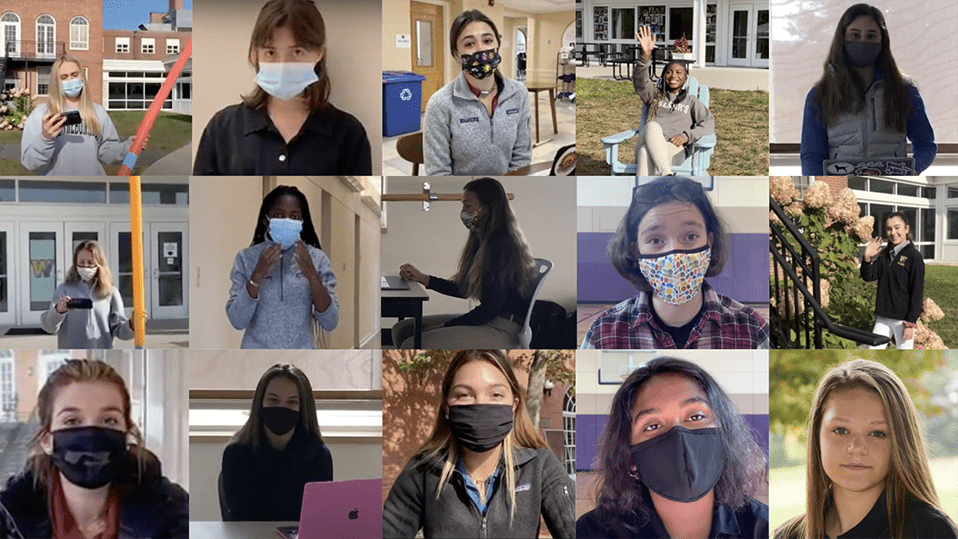
Students in Dr. Suzanne Piela’s Public Health course
Over the summer, while Science Department Chair Dr. Suzanne Piela was mostly in lockdown, she began mapping out how to translate what was happening with the global pandemic into her Walker’s classroom. She wanted to get students thinking deeply about the crisis around them — from the issues of disease and outbreak to related social and racial inequities. As a result, she launched a Public Health course this fall which is a yearlong multidisciplinary exploration that puts students on the educational frontline of one of the most serious subjects of our times.
“My primary goal for this course is to introduce the students to the topic of public health and make them aware of the vast opportunities that are available in this field in order to make a local and global difference in the lives of others,” says Dr. Piela, whose own passion for public health was a driver behind creating the course. “In the course, students will learn about epidemiology and outbreak investigations, health surveillance, infectious and chronic disease, and health advocacy and health policy through film, case studies, and public health simulations.”
Dr. Piela’s own path to Walker’s campus started with veterinary school and then practicing at a small-animal clinic. It was there that she was introduced to the world of epidemiology and public health and when she started teaching, began to think of ways to bring the subject to the classroom. Dr. Piela taught several Lacuna courses (mini weeklong classes) on epidemiology, which led her to be selected for the Center for Disease Control’s (CDC) Ambassador Program. She spent a week at the CDC’s Atlanta headquarters in 2017 to learn how to create a public health high school course.
And if there was ever a year to bring that knowledge to her students, it was 2020.
For the Public Health course at Walker’s, Dr. Piela decided to forgo a textbook, and, instead, have students read and review some of the most timely material on the topic, including articles, journals and videos. Students also get a chance to experience epidemiological research first hand as the Walker’s community engages in a study with Yale University’s School of Public Health to explore new forms of contact tracing centered around the COVID-19 pandemic. Students are also studying the current COVID-19 pandemic through multiple lenses that include a study of epidemiology, vaccine development, and the health inequities that exist for certain populations based on lack of access to resources and the existence of systemic racism.
Dr. Piela says she is particularly passionate about social justice, and so a secondary goal of this course is to get students thinking about the social determinants of health and how unequal access to education, job opportunities, economic stability, health care services, community support, transportation, and basic resources play a large role in the overall health and life expectancy of individuals. “I want to inspire students to want to make change and develop solutions to address these inequities, thereby ensuring that a healthy life is a right for all and not a privilege for the few that can afford it.”
The multi-disciplinary look into public health has gotten students hooked, too. “I absolutely love my public health class,” says Chloe Lewis ’22, a boarding student from New York. “Everything we’re learning is super relevant and not only about health, but everything that affects a person or a community. I think this is the kind of class that everyone should take at some point.”
That’s a sentiment Dr. Piela hopes will motivate her students to keep exploring this field. “Now more than ever we need students entering the public health arena. I hope that some of my students find a passion for public health, because it is a necessary field that is key to our survival.”
In 2019, Walker’s received a shoutout from Dr. Anthony Fauci from the National Institute of Allergy and Infectious Diseases (NIAID). Walker’s Honors Biochemistry students were awarded the top high school prize for the 3rd Annual Small World Initiative (SWI) Do Something About Antibiotics Challenge™, which challenges high school students to do something about superbugs and the growing global antibiotic crisis.